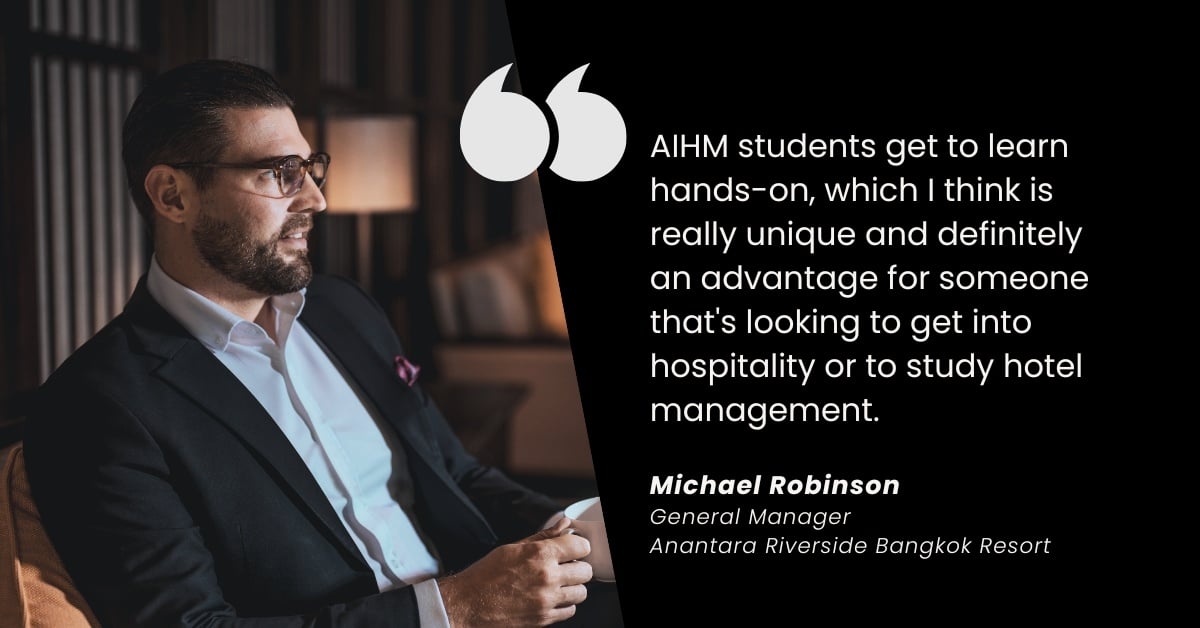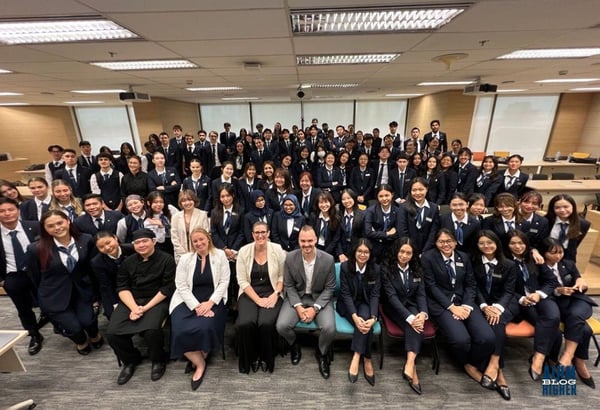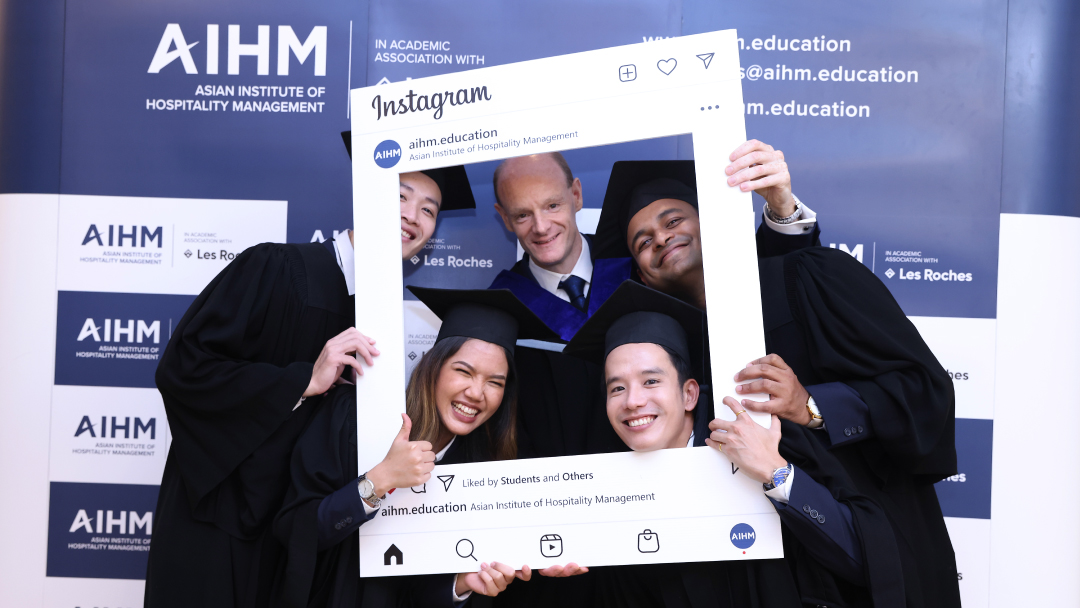Welcome to the Situation Room: Exploring the IHP

The team of consultants gathered in the Situation Room. The hotel’s senior management awaited them with a problem. The two parties assembled to tackle the issue. The luxurious riverside property in the heart of Bangkok is an exceptional hotel in a market filled with exceptional hotels. How might the property elevate its suite experience to keep its position amongst the top of pack?
Welcome to the scene of the Asian Institute of Hospitality Management’s latest Integrated Hospitality Project, the IHP. As AIHM students begin the sixth semester of their BBA degree, they embark on the IHP, a consulting project for a real-world hotel client. Despite what you might assume, this isn’t the students first rodeo. In previous semesters, they’ve completed smaller case studies and consulting-style projects. As students progress through the degree programme, AIHM’s faculty scaffold the students’ learning, helping them build up to the Semester 6 IHP. In earlier semesters, the Institute tasks students with projects that have smaller scopes and provide them with more faculty direction. With the big IHP in Semester 6, students take the wheel. Hotel management brief the student team directly and provide feedback along the way.
.jpg?width=600&height=411&name=IHP%2024.2%20(6).jpg)
While the IHP is developed primarily as a learning opportunity for the budding hoteliers earning their hospitality management degrees at AIHM, it tackles a real-world issue in an actual hotel. Upon the project’s completion, the hotel’s management have the luxury of moving forward with any elements of the consulting team’s solution that they desire to implement. Each year, students consistently come up with innovative solutions that the hotel teams can draw from and develop further or integrate into their action plans.
Last semester, the IHP’s faculty lead, Dr. Yuth Thongcharoen, connected students with Michael Robinson, the General Manager of Anantara Riverside Bangkok Resort, and his management team. We spoke with Michael Robinson as well as Prim Amornsupapol, one of the students who served as consultants in the most recent IHP. They shared their experiences from their respective sides of the table.
Robinson on AIHM’s Immersive Hospitality Environment
.jpg?width=600&height=411&name=IHP%2024.2%20(1).jpg)
Anantara Riverside has a special relationship with AIHM. The Anantara and its Avani sister hotel serve as the students’ extended classroom, with the AIHM campus located directly within the property. General Manager Michael Robinson highlighted the learning advantages of the one-of-a-kind setting.
“AIHM is unique for a hotel school with the fact that the students actually get to do their training in an operating hotel with real hotel guests. In a lot of hotel management schools, you do your training—you learn how to make a bed and those sorts of things—in a mock-up room. You learn food and beverage service by role-playing with other students and faculty, whereas with AIHM, students get to go into the Avani or the Anantara. They do this training and practice in an actual bar, in an actual restaurant or in an actual guest room.
“AIHM students get to learn hands-on, which I think is really unique and definitely an advantage for someone that's looking to get into hospitality or to study hotel management. AIHM’s students absolutely have an advantage with that. We’ve had the AIHM campus and its fantastic students integrated into the hotel for several years now, and it’s been inspiring to see how the immersive environment benefits the students as they learn the ins and outs of hotel operations in real-time.”
Prim on How the IHP Broadened Student Perspectives on Hospitality
For Prim and her fellow students, the IHP provided crucial real-world experience and insights that would have been difficult to grasp in the classroom alone.
“Before the project, I saw hospitality mostly as providing good service. The key thing to me was the service mindset. But the IHP highlighted how much more is involved. It’s about integrating so many aspects—design, amenities, luxury elements, tangible objects, and how we approach the guest experience. It broadened my concept of hospitality and reinforced all the concrete and experiential aspects.”
.jpg?width=600&height=411&name=AIHM-Hospitality-Management-IHP%20(1).jpg)
Prim on Practical Application and Adaptation
Prim reflected on how the project bridged the gap between theoretical knowledge and practical application. She explained, for example, how the team learned to streamline their work processes due to time constraints.
"When we realised how fast things were moving, we simplified our delegation structure. Theory would suggest that you implement a RASI model, but we decided that designing the RASI table would be too complex and time consuming given our real-world situation. So we boiled it down to a simpler format that still got the job done. It taught me a lot about balancing efficiency with thoroughness. Luckily, we were already familiar with the RASI matrix so we were able to adapt and simplify the approach to our needs."
Robinson on Bridging the Digital Divide
How did the hotel’s management approach developing the initial brief while taking into account generational differences? How did the managers provide targeted guidance that brought with it the benefit of industry veterans’ experience? Robinson explained:
“I think probably the biggest concern we have is that these students from a younger generation are very tech-savvy so tech solutions are often top-of-mind for them. However, the heart of hospitality is being present in front of the guests. A lot of what’s being put forward from the younger generation is: Oh, you need an app for this. You need chatbots. You need all of these sorts of things. Tech can play an important role in streamlining operations, but we have to be careful, because it also takes the human interaction out of the experience. That was a major concern we had as we began this project. Part of our brief to the students was to make sure that we're not just putting AI everywhere through the hotel. There still needs to be some form of human interaction.
.jpg?width=600&height=411&name=AIHM-Hospitality-Management-IHP%20(5).jpg)
“In this day and age, when you think about improving services and experiences, there is a lot of looking at ways you use technology. That can sometimes take a step away from the human interaction. It’s very important for us to not lose touch of personalised service. A lot of the experience of visiting a five-star hotel is having that interaction with staff members and how they can exceed guests' expectations and provide intuitive service. I think that marks the differences between a luxury hotel and a normal hotel.
“Working with the younger generation and helping them break into this industry requires a balancing act—uniting their unique skills and technological sophistication with the more high-touch and humanistic skills and insights that are still at the heart of the hospitality experience.”
Prim on Creativity and Finding Balance
Prim discussed how the project pushed the student team to balance creativity with practicality, especially when pitching ideas to the hotel’s management team.
“One of the biggest challenges was making sure our ideas were grounded in reality. We had some really creative concepts, but we had to keep asking ourselves: Will this actually work in a luxury hotel? What’s feasible?
“For example, we proposed customised luggage tags, which was a personalised detail one of us encountered on an internship at another luxury resort. After talking with the team, we realised it might not be possible to implement in this property without in-house artisans.”
.jpg?width=600&height=411&name=AIHM-Hospitality-Management-IHP%20(3).jpg)
Prim on Agility and Adaptability
One of the most vital aspects of the IHP is that the student team work directly with the hotel client. Students not only had to develop a solution; they had to present their ideas to the hotel’s GM. In addition to ideation, problem-solving, project management and leadership skills, they needed to flex their presentation skills. It doesn’t matter how good your ideas are if you can’t clearly and compellingly communicate them.
An unexpected hurdle came when the team was running short on time and realised they needed to make their presentation more tangible for the GM.
“When we were pitching our ideas, we realised that just talking wasn’t enough. The GM wouldn’t be able to fully visualise what we were suggesting. So, at the last minute, we scrambled to gather props to make our ideas more concrete. It was stressful, but it paid off in the end.”
.jpg?width=600&height=411&name=AIHM-Hospitality-Management-IHP%20(2).jpg)
Robinson on the Next Generation’s Career Trajectories
AIHM research by Dr. Yuth Thongcharoen and Samantha Lauver-Marion is already highlighting this generation’s need for speed. Robinson also noted this trend and its implications for the industry.
“Everyone wants to go immediately into what they deem as the fun or the important positions. You don't see too many people saying that they want to go and work in Housekeeping or Engineering or these sorts of really crucial departments. A lot of hotel students are really looking to get into HR or Sales and Marketing or Revenue Management and these kinds of business areas. In the past, there was a stepping-stone path. You had to start in Housekeeping or Front Office or Food and Beverage, and then you were able to work your way into other departments.
“Today’s aspiring hotel managers are really focused on rapid growth. When you ask them what path they’re going to take next, they’re looking for management traineeships and fast-track programmes or looking to go directly into fields like Sales & Marketing.
.jpg?width=600&height=411&name=AIHM-Hospitality-Management-IHP%20(4).jpg)
“This is inspiring—and also a challenge the industry needs to address. In the past, as managers, we all started off at the bottom and experienced a huge learning curve as we moved through various jobs and hotels. You spent time as a waiter or steward or in housekeeping, for example. For me in particular, I spent a lot of my career in the Front Office. I wouldn’t have become the manager I am today without having those experiences. With today’s dedicated students being able to skip those formative years to a certain degree, I wonder how we can continue to ingrain the unique hospitality principles that traditionally were gained over time as you moved up more slowly.
“Like any business environment, things change over time and organisations have to develop new strategies to react to the evolution. It’s true that this is a challenge, but honestly, it’s also refreshing to see that young people still have an interest in hospitality, and they’re not just wanting to get into data mining or coding and these digital careers that have popped up. There’s still a passion for human connection and creating memorable real-world experiences.”
.jpg?width=600&height=411&name=IHP%2024.2%20(8).jpg)
Prim on Personal Discoveries
Over the course of the IHP, students took on individual roles. Prim, for example, took on a leadership role coordinating team members to complete project tasks, pairing students, conducting team check-ins, etc.
“This project helped me to highlight my personal skills and strengths. I knew I had these abilities, but the project proved it to me. It was like a validation through real-world experience. I would say I kind of knew my strengths, but I wasn’t fully confident in them yet. This project was a proof of concept. It allowed me to implement and demonstrate my skills, to get to know my abilities more fully.”
Achieve Your Dreams with AIHM
Do you dream of a life in luxury hotels and island hideaways? Do you want to make your mark in the business world in an industry that still values human warmth and an individual touch?
AIHM’s educational tracks can help you get to where you want to be. Explore the BBA degree and related programmes.
Are you a hotelier interested in partnering with AIHM for an Integrated Hospitality Project, internships or other collaborations? Please contact Samantha Lauver-Marion, Director of Global Partnerships. She’d be delighted to speak with you and explore the possibilities.



-2.png)